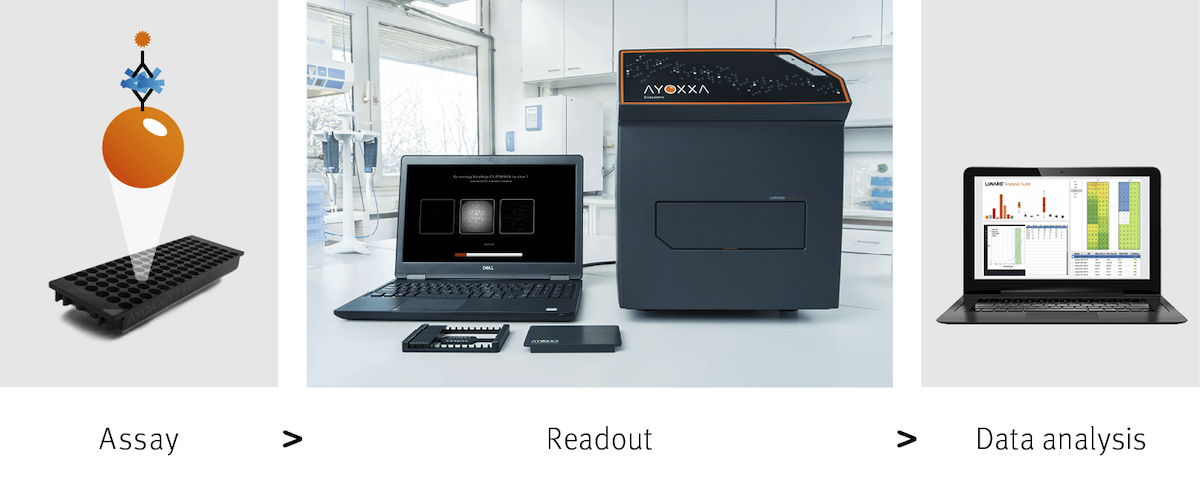Members Login

Channels
Special Offers & Promotions
AYOXXA Launches the new LUNARIS Reader Designed to Facilitate Translational Research in Academic and Industrial Laboratories
AYOXXA Biosystems GmbH, an international biotechnology company offering a range of products and services which enable advances in translational proteomics, announces the launch of their next generation LUNARIS Reader.
Available in two different models (LUNARIS Reader 96 for up to 96 samples and LUNARIS Reader 384 scalable for up to 384 samples), the readers expand the Company's product portfolio to address the different throughput and use requirements of academic and governmental, as well as pharmaceutical and biotechnology, laboratories. The reader combines the advantages of a bead-based multiplexing approach plus the reliability and scalability of a plate-based format with the simplicity of image-based analysis. It is equipped with renowned German high-precision optics, supports load-and-read handling and is fully scalable from low- to high-throughput applications.
"Every biological sample contains vast information which can help elucidate the complex processes of health and disease. Capturing insights from as many targets as possible and performing measurements from even very scarce sample sources should be straightforward for anyone in the laboratory. This is the premise behind our LUNARIS platform - standardized, simultaneous detection of multiple analytes using our LUNARIS Kits and seamless read-out on the LUNARIS Reader for all formats and throughputs," said Rodney Turner, CEO of AYOXXA."With the launch of our next generation LUNARIS Reader models 96/384 we further shift boundaries in terms of quality, flexibility and efficiency enabling reliable quantification of biomarkers from model to man, from laboratory to clinic, from data to insight."
Flexibility & modularity: Two models for scalable low- to high-throughput applications
With a small footprint of only 14" x 18" and height of 16.5" (34 x 46 x 42 cm), the two LUNARIS Reader models fit easily on any lab bench and the corresponding BaseFrames for 96 or 384 samples can flexibly accommodate the full range of standard low- to high-throughput applications.
- The LUNARIS BaseFrame 384 ("Universal BaseFrame") can be modified for the scalable analysis of 96 samples to up to 384 samples. With a readout time of less than 10 minutes for 96 samples, the LUNARIST Reader 384 facilitates the readout of 384 samples in less than an hour.
- The LUNARIS Reader 96 is designed for the lower throughput of up to 96 samples and represents a suitable entry-level device or a feasible solution for low to medium sample volumes. Time-to-result is less than 20 minutes.
Ease-of-use: "Load and read" technology
Both LUNARIS Reader models feature "load and read" technology which enables standardized, simultaneous measurement of multiple analytes using LUNARIS Kits, with the plates in each kit automatically recognized by the LUNARIS Reader. Based on the intelligent QC function for reliability and workflow error-reduction, the system is very robust and capable of delivering best-in-class data quality in addition to complete data evaluation in less than a minute. All raw data and calculated results are exportable to customized reports or data spreadsheets. The intuitive software allows for the easy access to the analytical results in multiple formats.
Easy entry to multiplexing with minimum sample volume requirements
LUNARIS Kits are painstakingly optimized using the best quality antibody pairs to ensure the highest assay sensitivity and specificity with minimal cross reactivity in a multiplex format. Due to the innovative BioChip format and geometry, LUNARIS Kits can be performed using sample volumes as low as 3µL - which represents only 1/10 of the working volume required by comparable multiplex technologies. This low minimum volume requirement enables multiplex protein detection and quantification of multiple disease-relevant biomarkers from valuable and scarce human or animal samples, such as fine needle biopsies, vitreous fluid, cerebrospinal fluid, murine tail blood and many other clinically relevant sample types.
Based on an innovative plate design, antibody-coated beads are pre-deposited in spatially separated micro-cavities on the planar LUNARIS Chip. This variable bead-array format allows for straightforward assay development, flexible workflows and permits sample archiving for remote analysis, decoupling experimental execution from the readout.
"We are excited about our new state-of-the-art LUNARIS Reader family. The two models, providing low- to high-throughput multiplex protein analysis capability, and the competitive pricing allows a very attractive solution for workflow transition from single-plex ELISA to multiplex immunoassays in order to fuel translational research in academic and industrial laboratories", saidWolfgang Kintzel, Co-CEO of AYOXXA. "The profiling of biomarker signatures in multiplex formats is becoming the key to deciphering biological complexity in translational research in academic and pharmaceutical laboratories. We strongly believe that the technical superiority and outstanding competitive advantages of the newly launched next generation LUNARIS Readers will position LUNARIS as the system of choice in translational protein research."
The newly launched LUNARIS Reader Family: An integral part of the LUNARIS platform
The LUNARIS platform is comprised of a dedicated reader, complete data analysis and export software and a growing portfolio of LUNARIS multiplex protein assay kits for the detection and quantification of disease-related soluble inflammation and immune-response markers. The platform can be readily integrated into any laboratory routine and is optimized to provide easy-to-use, standardized workflow from sample to result.
Media Partners




